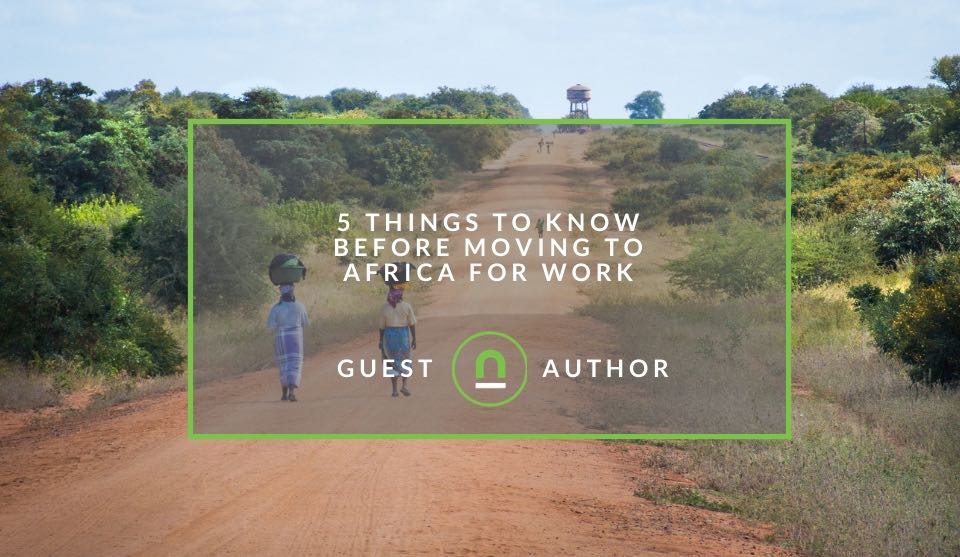Recent posts

Geek Chic
How to Replace A Broken Lenovo Laptop Screen
24 April 2025

Money Talks
Everything You Need to Know About SASSA Status Check
13 April 2025

Mind, Body & Soul
The Genetic Diversity of Cannabis Seeds
12 April 2025

Money Talks
How Small Businesses Can Leverage Blockchain Technology
02 April 2025
Popular posts
Extravaganza
Trending Music Hashtags To Get Your Posts Noticed
24 August 2018
Geek Chic
How To Fix iPhone/iPad Only Charging In Certain Positions
05 July 2020
Extravaganza
Trending Wedding Hashtags To Get Your Posts Noticed
18 September 2018
Money Talks
How To Find Coupons & Vouchers Online In South Africa
28 March 2019
5 Things to Know Before Moving to Africa for Work
29 October 2019 | 0 comments | Posted by Ellen Waters in Talent Agents
These days, travelling abroad to find work is easier than it ever was. And that includes the possibility of finding work in exotic and exciting places, like Africa! More and more foreigner citizens are looking for employment in Africa than ever before.
Naturally, if you’re not from a continent - this place might seem entirely foreign to you, with its plethora of diverse and exciting countries. And while that may be a jarring change for people from the developed world - you’ll soon realize that working here is the experience of a lifetime.
However, as with any other region, you’re not familiar with; you should have all the information about working there before you go. With that in mind, we’ve prepared some of the most important things to note.
Familiarise yourself with the immigration process
When foreigners think of Africa, they usually consider it a vast and homogenous continent. But once you take a closer look, you’ll realize it’s just as diverse as any other place on Earth.
Every single one of its 54 countries has different laws - including regulations on immigration. With that in mind, you should carefully consider where you want to seek employment first. And once you’ve pinpointed the right area, take some time to familiarize yourself with the immigration procedures that are in power there. In general, every country has its visa approval process, as well as different conditions for immigrant workers.
There could be several factors determining your work visa eligibility, like your country of origin, professional vocation, degree of education, etc. Just make sure you deal with all the paperwork far enough in advance; approval times vary wildly depending on the country.
If you’ve decided you want to find a job in the region, or you already have something lined up: make sure to kick-start the immigration process as soon as possible.
Prepare for the climate
Indeed, if you’re going to move to Africa for work - you can expect something of a culture shock. After all, no matter which country you go to; chances are that you aren’t going to be immediately familiar with the local way of life. But while that cultural jet lag is something you’ll become accustomed to naturally; there are specific changes in your lifestyle that you’ll have to prepare for in advance.
To be more precise - the local climate. Sure, there are countries on the continent that get quite cold during the winter - like Lesotho. But on average, the continent is quite hot, with 35 degrees Celsius being the norm.
This is nothing that you won’t be able to adjust to overtime, naturally; especially if you take care of how you dress and how you exercise. But if you’re going to be working outside instead of an office, you may consider relocating to Africa sometime before the job itself begins.
That way, you’ll have enough time to adapt to the weather conditions outside, if you’re not used to them.
Exploring the work conditions
If you’re from Europe or the United States, for example; there may be some things you take for granted, and that isn’t always a given in Africa. For example - electricity. In the past couple of decades, African countries have made significant strides in terms of electric grid construction. And this is an ongoing effort that most countries embark on even today.
But as a recent World Bank report states, some two-fifths of sub-Saharan African countries have limited to no access to electricity.
As you can see from the graph above, the countries which haven’t managed to implement electricity ultimately suffer consequences in terms of unemployment rates. With that in mind, you may want to explore your options in terms of available jobs.
Double-check market data
This ties into the previously mentioned varying availability of electricity - but you should also be careful about what market data you trust. All of us explore the development level of our industries in any given area, before looking for work there.
However, the limited electricity grids also dictate the amount of Internet coverage in a region. Now, as you probably know yourself; Africa is home to many countries with a fully developed infrastructure, both in terms of electricity and Internet availability.
If you move to such a country looking for work, you’ll find the market data no less reliable than, say, in the Netherlands. On the other hand, if you’re looking for employment in a less developed region - know that you’ll have to double and triple check all of the market data you encounter online.
Chances are some of it will be outdated - and you don’t want to stake your career on an area which may not house the industries you’re familiar with from your time in your homeland. That said, if you know about these conditions in advance - you’ll have no trouble finding employment.
Know the industries
Before you consider moving to Africa for work, you need to know which industries thrive there. And as you have probably realized by now; its plethora of countries have plenty of different burgeoning sectors, so giving you a one-sentence rundown isn’t easy. That being said, you should know that the agricultural sector is booming quite a lot in many countries.
As the local companies implement the latest technologies to increase their yields, you’ll find the industry employing more professionals than ever before. Also, a lot of resource-rich African regions have fantastic oil and gas industries as well. Nigeria has one of the most influential oil outputs in the entire world, with Egypt and Algeria not slouching in this regard either.
If you haven’t got the credentials and experience, it’s not easy to break into gas and oil. However, these are sectors with a lot of high-paying jobs, if you know what you’re doing.
Plus, professionals who land a job in these companies have no difficulties with the immigration process!
Handling work logistics
Before closing out this list, I’d be remiss not touching on the logistics of actually working in the myriad African industries. As mentioned above, the industries that handle the processing of natural resources like gas and oil are definitely on the rise on the continent; with economic trends indicating no signs of them slowing down. And crucially, moving to Africa for work doesn’t necessarily mean tying yourself down long-term.
You can find plenty of project-oriented jobs as an engineer or a consultant. Working as a freelancer and hopping from company to company depending on their current projects is viable. Of course, freelancing also means dealing with a lot of the procedural logistics on your own - such as invoicing. Naturally, knowing how to invoice as a freelancer is essential; though you won’t find the process too complicated.
These days, there are plenty of different software solutions to expedite invoicing, like Freshbooks or InvoiceNinja. With little to no effort, any freelancer in Africa will be able to handle such bureaucratic tasks as long as they have an Internet connection.
Africa is an incredible place with so many different cultures spread out across numerous countries. Working there and mixing with the people will be a fantastic experience, as long as you know what to expect and are expertly prepared.
Tell us your story
Would you like to write for nichemarket just like Ellen has? Find out how to submit a guest post and when you're ready, you can contact us.
Are you looking to promote your business?
South African recruitment businesses can create your free business listing on nichemarket. The more information you provide about your business, the easier it will be for your customers to find you online.
Registering with nichemarket is easy; all you will need to do is head over to our sign up form and follow the instructions. If you require a more detailed guide on how to create your profile or your listing, then we highly recommend you check out the following articles.
Recommended reading
If you enjoyed this post and have time to spare why not check out these related posts and dive deeper down the rabbit hole that is career advice.
- How to List Online Courses on Your Resume
- How Does Resume Parsing Speed up The Recruitment
- Why people analytics is the number 1 game changer in Tech
- Study Shows Hard Interviews Result In Better Jobs
- Why Your Resume Should Be One Page
Tags: Working Overseas, Guest Post
You might also like
The Role of Customer Service in Selecting a Forex Broker
29 March 2025
Posted by Cornelia Ekong in Money Talks
Discover why excellent customer service is crucial when choosing a Forex broker, and learn how to evaluate support quality before committing your cap...
Read moreEverything You Need to Know About SASSA Status Check
13 April 2025
Posted by Azhar Khanzada in Money Talks
A guide for 2025 for anyone looking to apply for a SASSA grant or would like to keep up to date with the status of your grant from application to red...
Read more{{comment.sUserName}}
{{comment.iDayLastEdit}} day ago
{{comment.iDayLastEdit}} days ago
 {{blogcategory.sCategoryName}}
{{blogcategory.sCategoryName}}

